Technologies

“Technology ("science of craft", from Greek τέχνη, techne, "art, skill, cunning of hand"; and -λογία, -logia) is the collection of techniques, skills, methods, and processes used in the production of goods or services or in the accomplishment of objectives, such as scientific investigation.”
This article aims to gather tech relevant for the well being of the populations and the planet. Technology can be used for good and evil this is a good reason to keep up-to-date on the problems and opportunities and good solutions.
Search for more technologies
Automation
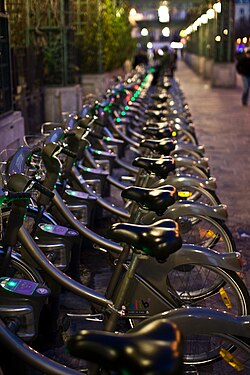
“Automation is the technology by which a process or procedure is performed with minimal human assistance.”
Robotics
Information automation
- 'Amazon makes Contact Lens generally available' at venturebeat.com, July 2020 reporting on Amazon's Contact Lens contact center automation system.
Computing
AI
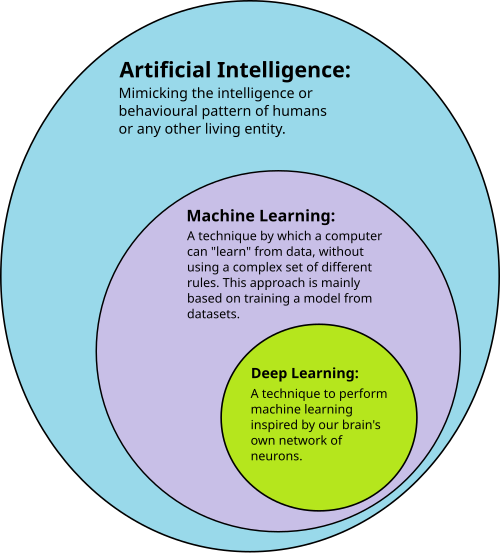
“Artificial intelligence (AI), sometimes called machine intelligence, is intelligence demonstrated by machines, in contrast to the natural intelligence displayed by humans and animals. Colloquially, the term "artificial intelligence" is used to describe machines that mimic "cognitive" functions that humans associate with other human minds, such as "learning" and "problem solving".”
Learn
AI ethics courses
AI courses
- 'AI For Everyone'' at coursera.org by Andrew Ng[1st seen in 1]
- 'Introduction to Artificial Intelligence (AI)'' at coursera.org by Rav Ahuja and offered by w:IBM[1st seen in 1]
- 'AI Foundations for Everyone Specialization'' at coursera.org by Rav Ahuja and offered by w:IBM[1st seen in 1]
- 'IBM Applied AI Professional Certificate'' at coursera.org by Rav Ahuja and offered by w:IBM[1st seen in 1]
- 'Artificial Intelligence: Reinforcement Learning in Python'' at udemy.com (for-a-small-fee)[1st seen in 1]
- 'Learn Data Science Online'' at datacamp.com has free tier and enterprise-tier[1st seen in 1]
- 'CS50's Introduction to Artificial Intelligence with Python'' at edx.org from the w:Harvard University[1st seen in 1]
- https://www.elementsofai.com/ - a free-of-charge 2 CU introductory course to AI made by the University of Helsinki and Reaktor Group Ltd
- http://introtodeeplearning.com/ - a free-of-charge introductory course to AI made by Massachusetts Institute of Technology
- https://korbit.ai/machinelearning - "LEARN AI WITH AN AI" by Korbit.ai
- 'AI Applications with Watson'' at edx.org from w:IBM[1st seen in 1]
- AI Foundations for Everyone Specialization
Started with AI using IBM Watson at coursera.org][1st seen in 3] offered by IBM
Lists of AI courses
- Best Certification Courses for Artificial Intelligence - Beginner to Advanced at mltut.com [1st seen in 3]
See also List of free education for education resources into other subjects.
Useful resources
- List of Natural Language Processing (NLP) Resources curated by pawangeek
For Consumerium
- ML Kit for Firebase is a mobile machine learning system for developers. It can be used to recognize barcodes and QR-codes. [1]
Reviews and regulation
- 'Regulation of Artificial Intelligence' at the w:Library of Congress (loc.gov)
- 'Regulation of Artificial Intelligence: Comparative Summary' at loc.gov
- 'Regulation of Artificial Intelligence: International and Regional Approaches' (loc.gov)
- 'Regulation of Artificial Intelligence: The Americas and the Caribbean' (loc.gov)
- 'Regulation of Artificial Intelligence: East/South Asia and the Pacific' (loc.gov)
- 'Regulation of Artificial Intelligence: Europe and Central Asia' loc.gov
- 'Regulation of Artificial Intelligence: Middle East and North Africa' (loc.gov)
- 'Regulation of Artificial Intelligence: Sub-Saharan Africa' (loc.gov)
From Europe
- 'The ethics of artificial intelligence: Issues and initiatives' (.pdf) at europarl.europa.eu, a March 2020 study by the w:European Parliamentary Research Service
From private companies Gibson Dunn & Crutcher (gibsondunn.com) is a global law firm, founded in Los Angeles in 1890. They publish a quarterly legal update on "Artificial Intelligence and Autonomous Systems"
- 'Artificial Intelligence and Autonomous Systems Legal Update Quarter 4 2018' at Gibson & Dunn
- 'Artificial Intelligence and Autonomous Systems Legal Update Quarter 1 2019'
- 'Artificial Intelligence and Autonomous Systems Legal Update Quarter 2 2019'
- 'Artificial Intelligence and Autonomous Systems Legal Update Quarter 3 2019'
- 'Artificial Intelligence and Autonomous Systems Legal Update Quarter 4 2019'
Fields
AI is can be divided to multiple subfields:
- w:Machine learning (ML) is the scientific study of w:algorithms and w:statistical models that w:computer systems use to effectively perform a specific task without using explicit instructions, relying on patterns and inference instead. ( Wikipedia )
- w:Natural language processing (NLP) is a subfield of w:computer science, information engineering, and w:artificial intelligence concerned with the interactions between computers and human (natural) languages, in particular how to program computers to process and analyze large amounts of w:natural language data. ( Wikipedia )
- w:Expert system is a computer system that emulates the decision-making ability of a human expert. ( Wikipedia )
Neuromorphic computing
w:Neuromorphic engineering is also known as neuromorphic computing is a concept developed by w:Carver Mead, in the late 1980s, describing the use of w:very-large-scale integration (VLSI) systems containing electronic w:analog circuits to mimic neuro-biological architectures present in the nervous system. In recent times, the term neuromorphic has been used to describe analog, digital, mixed-mode analog/digital VLSI, and software systems that implement models of w:neural systems (for w:perception, w:motor control, or w:multisensory integration). (Adapted from Wikipedia)
- 'Intel’s Neuromorphic Nose Learns Scents in Just One Sniff' at spectrum.ieee.org 2016 reporting
- 'Neuromorphic Computing: The Next-Level Artificial Intelligence' at artiba.org 2020 reporting
The SAFE Network (transcluded)
Transcluded from article on SAFE Network
The SAFE Network, by MaidSafe Ltd (.net) from w:Ayr, w:Scotland, is a radically rethought approach to the networking and computational needs of people on planet Earth.
According to the internets MAID == Massive Array of Internet Disks and SAFE == Secure Access for Everyone
MaidSafe consists of the SAFE Network and the MaidSafe apps.
The development of the SAFE Network is spearheaded by MaidSafe.net Ltd, founded in 2006 by David Irvine, that has donated all it's w:patents and code to the human kind. A spin-off/sidekick is The MaidSafe Foundation.
The SAFE Network has it's internal w:cryptocurrency called SafeCoin. It is minable by providing computation and data transmission utilities (non-NOP CPU cycles and bandwidth x time x utilization rate) for the MaidSafe network and farmeable by providing major diskspace.
Currently it is unclear whether SafeCoin will be of value in the sense of being exchangeable with other crypto- and conventional currencies, but if the bookies and/or cryptocurrency afficionados aren't considering buying some SafeCoin to rig the answer of the bet to "Yes!" we'd be surprised.
- https://safenetwork.tech/ - This is a very good place to learn about the upcoming SAFE Network
- https://primer.safenetwork.org/ is written by the SAFENetForum.org participants independently of MaidSafe.net Ltd.
- https://safenetforum.org/ is the place for discussion about SAFE Network
- SAFE Dev Forum
- Website of MaidSafe.net, the primus motor company behind the effort
- MaidSafe on GitHub
- SAFE Network subreddit
Ecological tech
There are various interesting ecological technologies being piloted.
Hydrogen
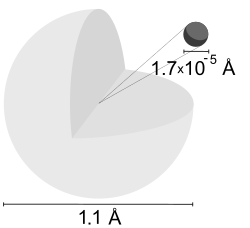
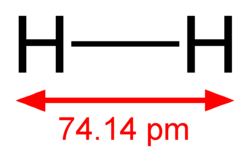
Hydrogen can be produced by from water by electrolysis even on an industrial scale, with #Hydrogen panels or from hydrocarbons by steam reforming.
Hydrogen fuel produced from (locally) harvested energy either by hydrogen panels or electrolysis plants can be considered and is being widely marketed as carbon-free, whereas steam reforming from other fuels causes carbon emissions.
“The Hydrogen economy is the use of hydrogen as a low carbon fuel, particularly for heating, hydrogen vehicles,[2] seasonal energy storage and long distance transport of energy.[3]”
Hydrogen panels
Researchers from KU Leuven, Belgium have created w:solar hydrogen panels, that convert water vapor to hydrogen and oxygen using sunlight.
- 'Green Energy Breakthrough Thanks to KU Leuven Scientists' at kuleuven.be. Quote: "The panel is able to directly convert no less than 15 per cent of sunlight into hydrogen gas, Which is a world record."
- KU Leuven News: 'Looking past the hype: KU Leuven researchers shed more light on their hydrogen panel' (March 2019)
Hydrogen aviation
- ZeroAvia.com has been developing fuel cell-based powertrains for aviation.
Links
- 'ZeroAvia’s Hydrogen-Fueled Powertrain for Zero-Emission Aircraft' at AZoCleanTech.com
- 'Airbus Unveils Hydrogen Designs for Zero-Emission Flight' at Bloomberg.com reports in September 2020, that w:Airbus is working on three hydrogen plane designs.
Hydrogen purified steel
HYBRIT is an abbreviation of HYdrogen BReakthrough Ironmaking Technology, where iron for steel making is not purified by a process called coking, but instead using massive amounts of hydrogen to purify it.
w:SSAB and partners are building a small-scale pilot production line in Luleå, Sweden, slated to be launched in 2020.
- Official HYBRIT development website for more info.
Ecological electric
Sodium batteries
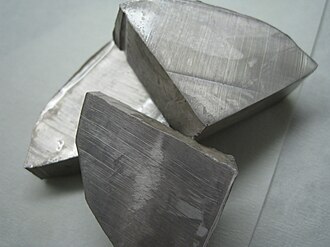
Scientific articles
- 'Sodium-ion batteries: present and future' at pubs.rsc.org published in w:Chemical Society Reviews issue 12, 2017
Reporting
- [https://www.intelligentliving.co/improved-sodium-ion-battery/ 'Improved Sodium-Ion Battery Could Rival Lithium-Ion Models', July 2020 reporting at intelligentliving.co
Broadbit sodium batteries
- http://www.broadbit.com/ is a technology company developing revolutionary new batteries using novel sodium-based chemistries to power the future green economy.
IBM sodium batteries
- 'Free of Heavy Metals, New Battery Design Could Alleviate Environmental Concerns' at IBM Research Blog, a Dec 2018 post
Plant-based batteries and supercapacitors
“A supercapacitor is a high-capacity capacitor with a capacitance value much higher than other capacitors, but with lower voltage limits, that bridges the gap between electrolytic capacitors and rechargeable batteries. It typically stores 10 to 100 times more energy per unit volume or mass than electrolytic capacitors, can accept and deliver charge much faster than batteries, and tolerates many more charge and discharge cycles than rechargeable batteries.”
“Supercapacitors are used in applications requiring many rapid charge/discharge cycles, rather than long term compact energy storage — in automobiles, buses, trains, cranes and elevators, where they are used for regenerative braking, short-term energy storage, or burst-mode power delivery.”
Spent hemp has been studied for use in electrical engineering.
- 'Interconnected Carbon Nanosheets Derived from Hemp for Ultrafast Supercapacitors with High Energy', a 2014 scientific article published in w:ACS Nano, a monthly, peer-reviewed, w:scientific journal, published by the w:American Chemical Society.
- BBC.com article on 'Hemp fibres "better than graphene"' (2014)
- 'Hemp Battery As Good As Lithium Ion?' at youtube.com (2016) by Robert Murray Smith
Pine bark and spent grain studied for biocoal for batteries and supercapacitors
- VTT Technical Research Centre of Finland blog post "Greener electronics from spent grain and pine bark" states that VTT and Aalto University have joined the Academy of Finland's FinnCERES flagship programme to study the possibilities of using biocoal made from brewery waste and pulp mill waste to make batteries, w:supercapacitors and solar panels.
CO2 capture
CO2 capture can refer to capturing CO2 from an industrial process or just grabbing it from air.
Power-to-gas
Power-to-gas technologies are advancing. Power-to-gas involves energy losses in the conversion, but the power of gaseous energy that it is much cheaper to store than electricity, plus the distribution networks largely exist already.
Potential target fuels are hydrogen and methane. Hydrogen is being mixed into natural gas networks in Germany with no negative side-effects.
w:Methanation is the process of making methane from carbon oxides and hydrogen. Methane is a drop-in replacement for LNG and therefore could help us away from fossil dependence/capitalism. The price of proton-exchange electrolyzers has dropped by roughly 40 percent during the past decade the Scientific American Reports
Converting excess electricity from solar and wind farms to gases may be a very good idea as they can then readily be used to produce electricity during low-output times of solar and wind energy and because the systems to store the gas already exist.
Recycling tech
Plastics-to-fuel
Researchers from Purdue University have developed a technology entitled 'Use of Supercritical Water for the Liquefaction of Polypropylene into Oil' that works on polyolefin waste, the sort of plastic used for grocery bags, toys, and shrink wrap. This sort of plastic accounts for about 23% of plastic waste, according to researchers who describe the process in a paper published in Sustainable Chemistry and Engineering, a publication of the American Chemical Society. The new technique uses a process called hydrothermal liquefaction, in which very high temperatures melt pellets of polyolefin and then dissolve them in water. The by-products of this process are oil, gas, or solvents.[4]
Links about plastics-to-fuel
- 'Chemical Conversion of Plastic Waste into Fuel', a Youtube by Purdue Engineering (2019-02)
Food tech
Food from air and electricity
In Finland Solar Foods Ltd. has demonstrated making protein called Solein with renewable electricity and CO2 as raw material and are building their first real plant soon.
Water demand of this new method is fraction of plant-based nutrition, let alone meats and it is slightly CO2 negative if the electricity is not from CO2 emitting power plants.
- YLE (Finnish public broadcasting corporation) reporting on Solein: Finnish breakthrough: Making protein out of thin air and electricity (2017)
- The Guardian reporting on 'Plan to sell 50m meals made from electricity, water and air' (2019)
Cattle emissions
According to Australian research, if 2% dry matter of the Asparagopsis taxiformis seaweed is added to cattle fodder, the bovines' methane production falls to a tiny fraction (fall of 98.9%) in 72 hrs compared to cattle fed with traditional feed.
Scientific articles
- 'The red macroalgae Asparagopsis taxiformis is a potent natural antimethanogenic that reduces methane production during in vitro fermentation with rumen fluid' was published in Animal Production Science, a journal by CSIRO Publishing in February 2016
- 'Asparagopsis taxiformis decreases enteric methane production from sheep' published in Animal Production Science in August 2016
Links
Ecological materials
Decarbonized concrete
- ZeroCAL: Eliminating Carbon Dioxide Emissions from Limestone’s Decomposition to Decarbonize Cement Production at pubs.acs.org[1st seen in 4], a 2024 perspective article on a new method to manufacture cement with significantly less CO2 pollution, published in w:ACS Sustainable Chemistry & Engineering
- Reporting in Finnish at Jopa 98 % vähemmän hiilidioksidia – Insinöörit keksivät sementin valmistukseen uuden menetelmän at tekniikkatalous.fi (paywalled)
Hemp wood
From seed to building material in less than a year is a reality in Kentucky as the first HempWood factory has opened. HempWood is said to have slightly better characteristics than oak.
Hempcrete
w:Hempcrete is a w:bio-composite material for construction.
Hemp plastic
- https://hempplastic.com/ - The Hemp Plastic company
Limestone-based materials
- LIMEX is a new material mainly made from limestone, that can become an alternative to paper and plastic. It is developed by TBM Co., Ltd., a Japanese company
Biomass-based materials
- w:Zeoform zeoform.com is a new material developed and patented by an Australian company Zeo IP Pty. It is derived from w:cellulose and w:water,[5] transforming w:lignocellulosic fibres from industrial w:biomass into a w:structural material suitable for various applications in the w:industrial sector. It is claimed to be non toxic, w:biodegradable and could be used as a replacement for many forms of hard w:plastics, as well as synthetic and chemical composites.[6][7] (From Wikipedia)
Hemp tech
Development of sound hemp products has suffered from the prohibition of the plant since 1937
Wikipedia's list of hemp products is not complete by a far shot.
Links
- 'We Should Be Pouring Time And Money Into Hemp, Period.', a September 2018 Forbes article
- 'Growing our way out of climate change by building with hemp and wood fibre', a 2014 article by The Guardian
Mobility tech
Lists of shared and alternative transport and traveler routers lists carsharing, carpooling and traveler router services around the world.
Ultimate mobility app of the future
w:self-driving cars + w:carsharing fleets + w:peer-to-peer carsharing services integration + w:carpooling services integration + public transport travel routing integration of maximum smoothness.
GoMore.dk already made the "world first" of having p2p carsharing and carpooling in same app. They also offer leasing if you want to be the one sharing your ride. Hooray for Denmark.
They currently work in Denmark, Sweden, Norway, France and Spain.
Consumerium tech
See systems selections for newest going ons
- Debian GNU/Linux LAMP virtual private servers-from-cloud
- w:shell (computer), shell tools, shell script, w:secure shell, w:public key cryptography,w:private key cryptography
- Core MediaWiki and it's categories, templates, extra namespaces, extensions and widgets, mw:Universal Language Selector
- w:Xen and w:KVM w:virtualization by the hosting guys ( ecological )
- DBpedia & Wikidata, w:SPARQL queries to query RDF subject/predicate/object w:triplets that are safely stored in a w:Triplestore
- w:Wikiteam backs up wikis, XML Import-Export
- Security, backups on dumps.consumium.org, backups on archive.org courtesy of w:Wikiteam, off-line backups on removable media and other storage w:mysqldump, Special:Export, w:anachronistic scheduler, rsync-over-ssh, w:Tripwire, w:GPG, w:MD5, w:HTTPS, triple security
- Networking, TCP/IP, w:VPN, w:VNC, closed w:subnet, w:iptables firewall
- Languages, w:PHP, w:python, w:perl, w:regex, SPARQL, Français, SQL, XML, RDF ...
- Stats, w:analog (program), hosting guys' stats, historical stats, http://stats.consumium.org potentially a breadcrumbs solution
- Internet Relay Chat - RecentChanges irc feeds - RecentChanges regex stalk irc feeds with BetaCommandBot or similar - ircbot/mediawikibot integration -> ConsUtilityBot ( probably in w:python based on the pyWikipediaBot framework )
References
- ↑ https://medium.com/@bapspatil/ok-ml-kit-how-smart-are-you-83c9e58b7330
- ↑ A portfolio of power-trains for Europe: a fact-based analysis
- ↑ IEA H2 2019, p. 13
- ↑ https://www.technologyreview.com/f/612935/a-new-chemical-process-could-turn-a-quarter-of-our-plastic-waste-into-clean-fuel/
- ↑ "Startup Develops Eco-Friendly Material to Replace Wood and Plastic". triplepundit.com. October 16, 2013. Retrieved 2014-05-27.
- ↑ "Eco Monday: Zeoform, the New Miracle Eco-Plastic?". redesignrevolution.com. October 21, 2013. Retrieved 2014-05-27.
- ↑ "Zeoform: The eco-friendly building material of the future?". gizmag.com. August 29, 2013. Retrieved 2014-05-27.
1st seen in
- ↑ 1.00 1.01 1.02 1.03 1.04 1.05 1.06 1.07 1.08 1.09 1.10 1.11 Aditya Singh → "Artificial intelligence, Machine learning, Deep learning" https://www.facebook.com/groups/2059467967664033/permalink/2769532309990925/
- ↑ https://www.facebook.com/groups/2059467967664033/ 'Artificial intelligence, Machine learning, Deep learning' Facebook group
- ↑ 3.0 3.1 3.2 https://www.mltut.com/best-certification-courses-for-artificial-intelligence/ via comment by Aqsa Zafar to post https://www.facebook.com/groups/2059467967664033/permalink/2977621252515362/ in Artificial intelligence, Machine learning, Deep learning Facebook group
- ↑ https://www.tekniikkatalous.fi/uutiset/tt/1ad88899-7fe0-44a3-aa13-6c0e58f343fe?utm_term=Autofeed&utm_medium=Social&utm_source=Facebook#Echobox=1729269959